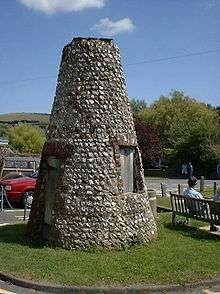Alfriston
| Alfriston | |
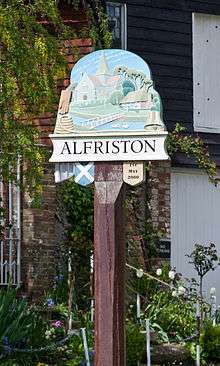 |
|
 Alfriston |
|
| Area | 9.36 km2 (3.61 sq mi) [1] |
|---|---|
| Population | 829 (2011)[2] |
| – density | 214.2/sq mi (82.7/km2) |
| OS grid reference | TQ519030 |
| – London | 49 miles (79 km) NNW |
| District | Wealden |
| Shire county | East Sussex |
| Region | South East |
| Country | England |
| Sovereign state | United Kingdom |
| Post town | POLEGATE |
| Postcode district | BN26 |
| Dialling code | 01323 |
| Police | Sussex |
| Fire | East Sussex |
| Ambulance | South East Coast |
| EU Parliament | South East England |
| UK Parliament | Lewes |
| Website | http://www.alfriston-village.co.uk/ |
|
|
Coordinates: 50°49′N 0°10′E / 50.81°N 0.16°E
Alfriston is a village and civil parish in the Sussex district of Wealden, England. The village lies in the valley of the River Cuckmere, about four miles (6 km) north-east of Seaford and south of the main A27 trunk road and part of the large area of Polegate. The parish has a population of 769 (2001 census), increasing to 829 at the 2011 census.[2]
History
Most of these notes have been adapted from the Village Reference website[3]
There is strong evidence of ancient occupation of the area, since several Neolithic long barrows have been discovered on the surrounding Downs; among them, to the west is the fairly well preserved Long Burgh. In Saxon times the village was recorded as Aelfrictun (the town of Alfric), from which the Domesday Book records the town as 'Elfricesh-tun'.[4]
One building of historical importance is the Star Inn. Originally a religious hostel built in 1345 and used to accommodate monks and pilgrims en route from Battle Abbey to the shrine of St Richard, patron saint of Sussex, at Chichester Cathedral, it became an inn in the 16th century.[5] Wooden figures grace the upper part of the building, whilst in the front is a one-time ship's figurehead representing a red lion. The latter is connected with the Alfriston smuggling gang who used the inn as a base; their leader was transported to Australia in 1830.
Governance
An electoral ward in the same name exists. This ward stretches north to Chalvington with Ripe and has a total population taken at the 2011 census of 2,321.[6]
Churches
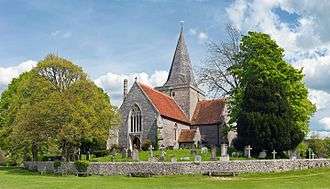
The Alfriston parish church, dedicated to St Andrew, has Saxon origins, although most of the building dates from the 14th century: it is known, because of its size, as The Cathedral of the South Downs. It sits on a small, flint-walled mound in the middle of "the Tye" (the local village green), overlooking the River Cuckmere, and is surrounded by the flowered graveyard. It is built in the form of a cross. Today it is part of the united benefice which includes St Michael's Church at Litlington and All Saints Church at West Dean. Alfriston's former United Reformed Church is included in that grouping.[7]
The 14th Century Alfriston Clergy House close by, was originally the vicarage, but is now maintained by the National Trust. It was the very first property brought by the Trust in 1896 and it is a classic example of a Wealden hall house with thatched roof and timber-framed walls. It also has a tranquil garden and orchard on the banks of the Cuckmere.
The village of Alfriston
The east side of the village lies by the River Cuckmere and is home to the village green, which is called the Tye. In the centre of the Tye is St. Andrew's Church which lies on a raised mount surrounded by a flint wall. Next to it is the Alfriston Clergy House, a National Trust property, the first purchased by them. Also on the Tye is the Georgian Unitarian Chapel. The wooden sign for the village at the entrance to the Tye was carved by a previous vicar of the village who also repaired the Star Inn's red lion. The centre of the village is the Market Square which contains a market cross.
The village contains three pubs, the Star Inn, the Smugglers' Inn and the George Inn. A Channel 5 archaeology programme, Pub Dig, revealed evidence of long occupation of the site of the Smugglers' Inn, including signs of smuggling, animal butchery and neolithic activity at the rear of the building.[8]
-
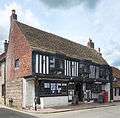
Star Inn
-
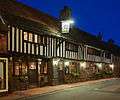
George Inn
-

Smugglers Inn
The South Downs Way crosses the river in Alfriston, and then continues up onto the Downs. During the week leading up to the August bank holiday weekend, there is the Alfriston Festival, which ends with a Grand Fair on the Tye, with the proceeds going to several local national charities. It is attended by a large number of people from many miles around.[9] In December there is also an Alfriston Christmas Weekend.[10] The village also has its own clay pigeon shooting club.[11]
The Alfriston Cricket Club has won the Cuckmere Valley League on nine occasions, with the earliest being 1920 and the most recent 2003.[12]
The arts and Alfriston
In 1931 Eleanor Farjeon wrote the popular hymn "Morning Has Broken" in Alfriston; the hymn is supposedly about the beauty she saw around her in this village. The song was later recorded by Cat Stevens in the 1970s, reaching a wider audience.
The 1946 novel Uneasy Terms by international best-selling crime and thriller writer Peter Cheyney, is set mainly in and around Alfriston. The private detective Slim Callaghan stays in one of the pubs in Alfriston, which in the novel is called 'The Two Friars', whilst solving a murder at the nearby house 'Dark Spinney', home of the Alardyse family. The author describes the village thus: "Callaghan walked slowly through the open space at the end of Alfriston High Street. The afternoon sun shone on the old houses, and the tree in the middle of the little square threw a pleasant shadow."
Several other local places are mentioned in the novel, among them Brighton, Eastbourne, Herstmonceaux, Pevensey Bay, Rottingdean and Polegate. The book was made into a film in 1948, starring Moira Lister and Michael Rennie.
Cheyney also mentions Alfriston in several other of his novels, including Dance without Music (1947).
Another well-known thriller-writer, Victor Canning, sets the Prologue to his 1956 novel The Hidden Face (US Burden of Proof) in Alfriston. The hero Peter Barlow comes to the village to confront a resident, James Gurney Hansford, who has cheated his father and driven him to suicide. They fight. Later Hansford is murdered and Barlow wrongly convicted of the crime.
The 1964 film The Chalk Garden starring Sir John Mills, Hayley Mills and Deborah Kerr was filmed in and around the village.
Peter Sellers' 1962 film Waltz of the Toreadors was also filmed here.

References
- ↑ "East Sussex in Figures". East Sussex County Council. Retrieved 26 April 2008.
- 1 2 "Civil Parish population 2011". Neighbourhood Statistics. Office for National Statistics. Retrieved 8 October 2015.
- ↑ The Village Reference: Alfriston:Smuggling and Ghosts
- ↑ "Alfriston". Kelly's Directory. 1911. Archived from the original on 16 May 2008. Retrieved 24 April 2008.
- ↑ http://www.thestaralfriston.co.uk/downloads/Walk1.pdf
- ↑ "Ward population 2011". Retrieved 8 October 2015.
- ↑ Alfriston churches
- ↑ http://www.channel5.com/shows/rory-mcgraths-pub-dig
- ↑ http://www.alfriston-village.co.uk/festival/index.html
- ↑ http://www.alfriston-village.co.uk/events/recent/index.html
- ↑ http://www.alfriston-village.co.uk/services/index.html
- ↑ http://www.alfriston-village.co.uk/cricketclub/titles/index.html
External links
| Wikimedia Commons has media related to Alfriston, East Sussex. |
- Alfriston in the Domesday Book
